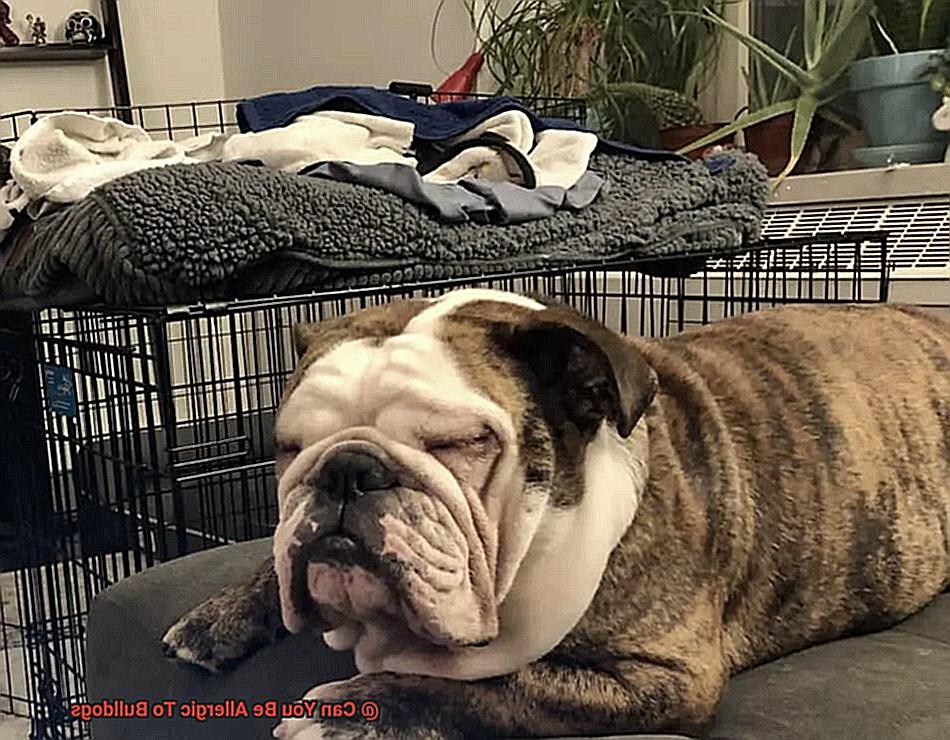Can You Be Allergic To Bulldogs?
Do you love Bulldogs but hate the sneezing, itching, and breathing struggles they bring?
You’re not alone. Allergies to Bulldogs exist, and they can be a real pain.
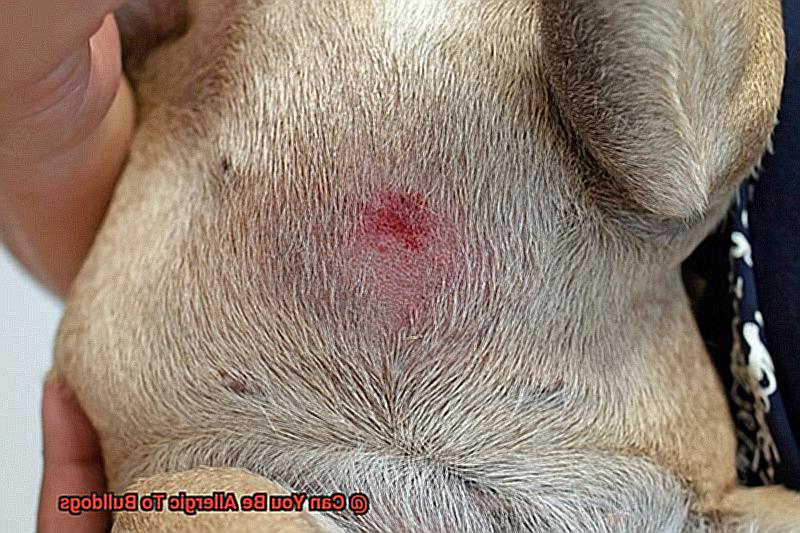
These wrinkly-faced cuties have stolen many hearts, but for some unlucky folks, being around them triggers allergic reactions. In this blog post, we’ll dive into why these allergies happen, what symptoms to look out for, and most importantly, how to deal with Bulldog allergies so you can peacefully coexist with your furry friend.
So if you’ve ever wondered if Bulldogs can make you sneeze your face off, keep reading for all the deets on this fascinating topic.
Can you be allergic to Bulldogs
Contents
- 1 Can you be allergic to Bulldogs
- 2 What Causes Dog Allergies?
- 3 Are Bulldogs Hypoallergenic?
- 4 Symptoms of Dog Allergies
- 5 How to Diagnose Dog Allergy
- 6 Solutions for People with Bulldog Allergies
- 7 Avoiding Allergen Exposure Around Bulldogs
- 8 Medications and Immunotherapy for Bulldog Allergies
- 9 Managing Bulldog Allergies in the Long-Term
- 10 Conclusion
French Bulldogs are adorable and affectionate companions, but for some individuals, concerns about allergies may arise. In this blog post, we will explore the causes of allergies to Bulldogs, including French Bulldogs, and provide valuable insights on managing allergies while still enjoying the company of these lovable pets.
Understanding Allergies:
Allergies occur when the body’s immune system reacts to certain substances called allergens. These allergens can include pet dander, saliva, urine, or even skin cells of an animal. When exposed to these allergens, individuals may experience symptoms such as sneezing, coughing, itchy or watery eyes, nasal congestion, or skin rashes.
Are Bulldogs Allergenic?
While allergies to dogs are not uncommon, being allergic to Bulldogs specifically may not be the case for everyone. The primary allergen associated with dogs is a protein called Can f 1, found in their skin cells and saliva. However, studies have shown that Bulldogs tend to produce lower levels of this protein compared to other breeds.
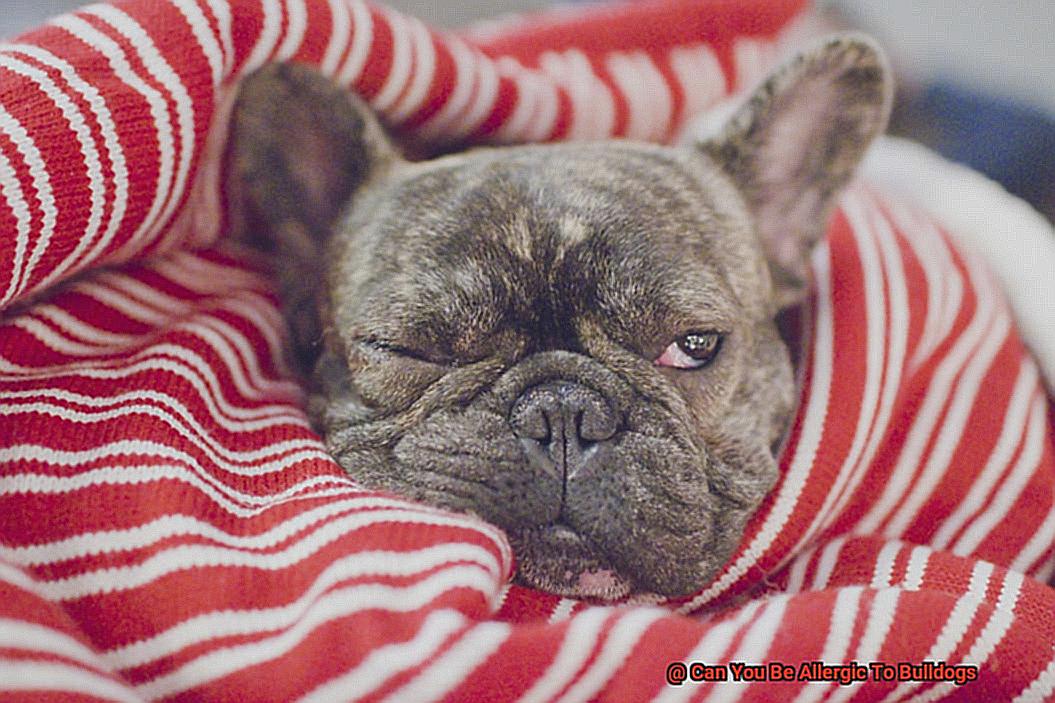
Individual Sensitivities:
It’s important to note that each person’s sensitivity to allergens can vary greatly. While some people may not experience any allergic symptoms around Bulldogs, others may still be allergic despite the lower levels of Can f 1 protein.
Consultation and Diagnosis:
If you suspect you have an allergy to Bulldogs or any other dog breed, it is advisable to consult with a medical professional or allergist for proper testing and diagnosis. Allergy tests can help identify specific allergens that trigger your symptoms and determine if you are indeed allergic to Bulldogs or any other dog breed.
Managing Allergies:
If you are diagnosed with a dog allergy but still wish to have a French Bulldog as a pet, there are measures you can take to minimize exposure to allergens:
- Regular Bathing: Bathe your French Bulldog regularly to reduce the amount of allergens on their skin and coat.
- Clean Living Environment: Keep your home clean and free from allergens by regularly vacuuming, dusting, and washing bedding.
Air Purifiers: Use air purifiers with HEPA filters to help remove allergens from the air.
What Causes Dog Allergies?
If you’ve been experiencing those frustrating allergy symptoms whenever you’re around your adorable Frenchie, you’re not alone. Dog allergies are a common concern for pet owners, and Bulldogs, with their irresistible charm, are no exception. So, let’s dive into what causes these pesky allergies and find out how we can still enjoy the company of our furry friends without sneezing up a storm.
Unmasking the Allergens:
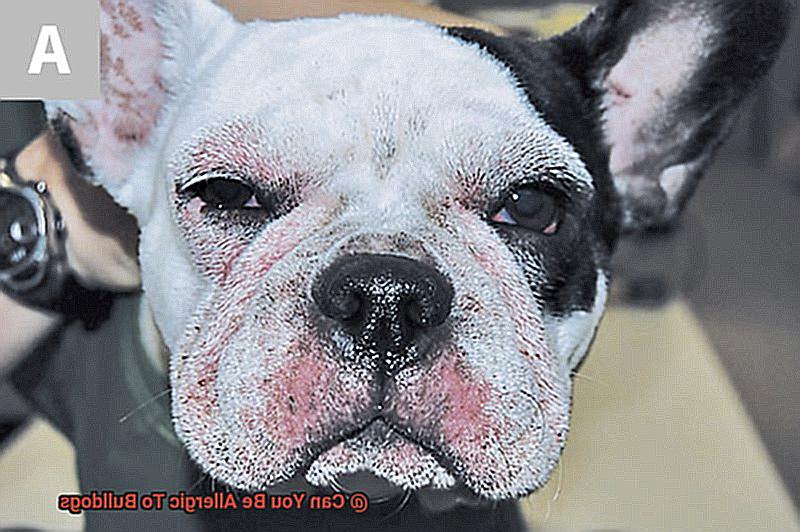
Airborne Allergens:
- Pollen: Bulldogs love outdoor adventures, but pollen particles can hitchhike on their fur and trigger allergic reactions in sensitive individuals.
- Mold Spores: Damp environments can harbor mold, and Bulldogs might unknowingly bring those spores indoors.

Food Ingredients:

Fleas and Their Saliva:
Medications:
Bulldogs and Potential Allergens:
While being specifically allergic to Bulldogs isn’t very common, it’s essential to consider that Bulldogs can carry allergens on their fur and skin. This includes outdoor allergens like pollen or mold spores that they encounter during their delightful frolics outside. Additionally, Bulldogs may be more prone to skin issues, such as dry skin or dermatitis, leading to increased shedding and dander production—both notorious triggers for allergies in us humans.
Managing Your Allergies:
Allergy Testing:
Minimizing Exposure:
Medications and Allergy Shots:
Are Bulldogs Hypoallergenic?
If you’ve been wondering whether Bulldogs are hypoallergenic, I’m here to provide you with some valuable insights. As an experienced dog owner and allergen researcher, I can shed light on this hairy topic. So, let’s dive in.
The Not-So-Hypoallergenic Truth:
- Allergenic Dander: Bulldogs, despite their charming appearance, are not considered hypoallergenic dogs. They produce allergenic dander – those tiny skin flakes that trigger allergies in sensitive individuals.
- Short Coat Misconception: Bulldogs do have a short coat, which might deceive some people into thinking they’re less likely to cause allergies. However, the length of their fur doesn’t affect the amount of allergenic dander they produce.
- The Culprit: Can f 1 Protein: The allergenic protein responsible for those pesky allergic reactions in susceptible individuals is called Can f Bulldogs have this protein in their dander, and unfortunately, it’s a major source of allergies.
- No Guarantees with Crossbreeding: Even if you were hoping that breeding a Bulldog with a hypoallergenic breed would result in hypoallergenic offspring, I’m sorry to burst your bubble. There’s no guarantee that the puppies will be hypoallergenic.
Managing Allergies and Enjoying Bulldog Companionship:
- Test the Waters: Before bringing a Bulldog into your home, spend some time with one to see how your allergies react. This trial period will help you determine if you can tolerate being around Bulldogs regularly.
- Seek Professional Guidance: Consulting an allergist or immunologist can provide valuable insights and guidance on managing allergies related to Bulldogs. They can recommend personalized strategies to help you coexist with these lovable dogs.
- Grooming and Cleaning Practices: Regular grooming and cleaning practices can significantly reduce allergenic dander in your home. Frequent brushing removes loose hair and dander, preventing it from becoming airborne. Investing in air purifiers and vacuum cleaners with HEPA filters helps keep allergens at bay.
Symptoms of Dog Allergies
In this blog post, we will explore the symptoms of dog allergies, with a focus on Bulldogs, and how they can differ from other allergies.
General Symptoms:
When it comes to dog allergies, the symptoms may be similar to those experienced with other animal allergies. These can include:
- Sneezing
- Runny nose
- Itchy and watery eyes
- Coughing
- Wheezing
- Nasal congestion
- Rashes
- Hives
- Itching
- Difficulty breathing
- Chest tightness
- Wheezing
- Allergen Avoidance: Keep your living space clean by regularly vacuuming and dusting. Consider using air purifiers or high-efficiency particulate air (HEPA) filters to reduce allergens in the air.
- Limited Access: Designate certain areas in your home where your French Bulldog is not allowed, such as bedrooms or furniture, to minimize allergen exposure.
- Personal Hygiene: Wash your hands thoroughly after interacting with your French Bulldog and avoid touching your face to prevent allergens from coming into direct contact with sensitive areas.
- Medications: Over-the-counter antihistamines or nasal corticosteroids can help alleviate allergy symptoms. Consult with your healthcare provider for appropriate medication options and dosages.
- Immunotherapy: Allergy shots or sublingual tablets may be recommended by your allergist for long-term management. These treatments gradually desensitize your immune system to specific allergens, reducing allergic reactions over time.
- Antihistamines: These are the go-to medications for reducing itching, sneezing, and other allergic reactions. Antihistamines work by blocking the effects of histamine, a chemical released by the immune system in response to an allergen. Popular antihistamines for Bulldogs include cetirizine, loratadine, and diphenhydramine. Remember, always consult with your veterinarian before giving any medication to your Bulldog.
- Steroids: In more severe cases, your vet may prescribe corticosteroids. These medications work by reducing inflammation and suppressing the immune response. However, they are typically used as a short-term solution or for acute flare-ups due to potential side effects from long-term use.
- Topical Treatments: To soothe irritated skin caused by allergies, your vet may recommend topical creams or medicated shampoos. Hydrocortisone creams are commonly used to reduce itching, while medicated shampoos can provide relief and nourish the skin.
- Regular Grooming: Brushing your bulldog regularly helps remove loose hair and dander, reducing allergens in your home.
- Clean Living Areas: Keep your bulldog’s living area clean and well-maintained, minimizing allergen buildup.
- Hypoallergenic Bedding: Invest in hypoallergenic bedding or furniture covers to limit allergen spread.
- Frequent Cleaning: Vacuum and dust your home frequently to eliminate allergens from surfaces.
- Air Purifiers or HEPA Filters: These devices help remove airborne allergens, providing relief for allergy sufferers.
- Proper Ventilation: Ensure proper ventilation in your home to reduce allergen concentration.
- Handwashing: Wash your hands thoroughly after petting or handling your bulldog to minimize allergen transfer.
- Avoid Touching Face or Eyes: Refrain from touching your face or eyes while interacting with your bulldog to prevent allergic reactions.
- Regular Washing: Wash bedding and clothing regularly to eliminate allergens.
Skin Reactions:
Bulldogs have wrinkled skin, which can make them more prone to skin reactions caused by allergens like dander. These reactions may include:
Asthma:
Some individuals with dog allergies may develop asthma symptoms when exposed to Bulldogs. These symptoms can include:
Severity of Symptoms:
The severity of dog allergy symptoms can vary from person to person. While some may only experience mild discomfort, others may have more severe reactions that significantly impact their quality of life.
Delayed Onset:
It’s important to note that dog allergy symptoms may not always appear immediately after exposure. In some cases, an individual may not realize they are allergic to Bulldogs until after owning one for some time.
Cross-Reactivity:
Individuals who are allergic to other animals, such as cats or horses, may also be allergic to Bulldogs due to cross-reactivity. The proteins found in animal dander can trigger an allergic response in susceptible individuals.
Differentiating from Other Allergies:
To accurately diagnose dog allergies, it’s crucial to differentiate them from other causes of similar symptoms, such as hay fever or other environmental allergens. Allergy testing conducted by a medical professional can confirm if the symptoms are specifically related to Bulldogs or other dogs.
How to Diagnose Dog Allergy
French Bulldogs are known for their adorable appearance and charming personalities. However, for some individuals, being around French Bulldogs or any dog breed can trigger allergic reactions. In this blog post, we will explore whether it’s possible to be allergic to French Bulldogs and how to manage allergies if you love these furry companions.
Understanding Dog Allergies:
Dog allergies are relatively common, affecting millions of people worldwide. The allergens that cause these reactions are proteins found in a dog’s saliva, dander (dead skin cells), and urine. When these proteins come into contact with a sensitive person’s immune system, it can cause an allergic response.
Are French Bulldogs More Allergenic?
While French Bulldogs have a short coat that sheds less than some other breeds, it’s important to note that allergies are not solely triggered by fur or shedding. Allergenic proteins are still present in a French Bulldog’s saliva, dander, and urine. These proteins can become airborne and easily come into contact with individuals who are allergic.
Diagnosing a French Bulldog Allergy:
If you suspect you may be allergic to French Bulldogs or any other dog breed, it is crucial to consult with an allergist for a proper diagnosis. Allergists can perform tests such as skin prick tests or blood tests to determine if you are specifically allergic to French Bulldogs or other dog breeds.
Managing French Bulldog Allergies:
If you are diagnosed with a French Bulldog allergy but still wish to have one as a pet, there are steps you can take to manage your allergies:
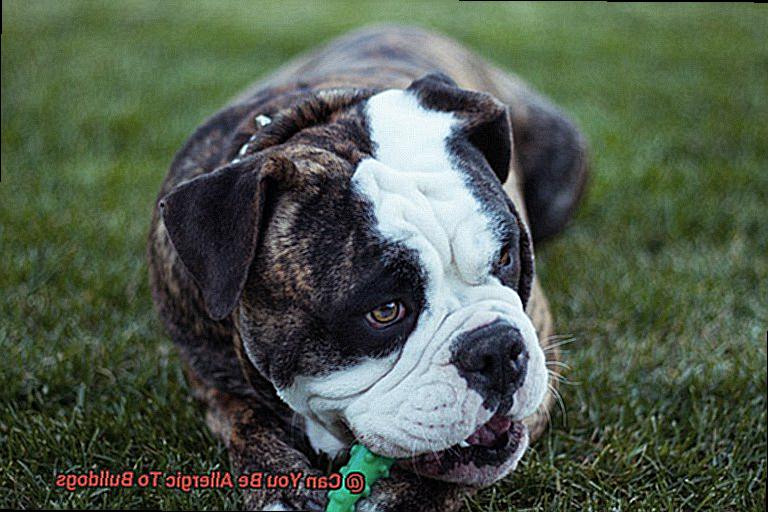
Solutions for People with Bulldog Allergies
French Bulldogs are undeniably adorable and lovable pets. However, for those who suffer from allergies, the thought of having a French Bulldog as a pet may seem impossible. But fear not. In this blog post, we will provide you with effective solutions to help you enjoy the companionship of these delightful dogs, even with your allergies.
Consider Hypoallergenic Bulldogs:
While no dog is completely hypoallergenic, certain breeds produce fewer allergens than others. If you have French Bulldog allergies, consider looking into hypoallergenic dog breeds that share similar characteristics with French Bulldogs.
Some options include the Miniature Schnauzer or the Bichon Frise. These breeds can provide the same Bulldog-like appearance and temperament while minimizing the risk of triggering allergic reactions.
Grooming and Cleaning Routines:
Proper grooming and cleaning routines are essential for managing allergies in French Bulldogs. Regular bathing and brushing can help remove allergens such as dander from their coat. Use hypoallergenic shampoos and grooming products specifically designed for sensitive dogs.
Additionally, keeping your home clean by vacuuming and dusting regularly can reduce allergen levels in your living environment.
Invest in High-Quality Air Purifiers:
To create an allergy-friendly environment, consider investing in high-quality air purifiers with HEPA filters. These purifiers can effectively remove allergens from the air, including pet dander and other airborne particles that can trigger allergic reactions. Place them strategically in commonly used areas of your home, such as the living room or bedroom.
Consult with an Allergist or Immunologist:
For individuals with severe allergies, it may be helpful to consult with an allergist or immunologist. They can perform specific allergy tests to determine if you are specifically allergic to French Bulldogs or if your allergies are triggered by other factors. Based on the results, they can provide personalized advice and recommendations for managing French Bulldog allergies.
Medication Options:
In cases of mild to moderate allergies, over-the-counter antihistamines or nasal sprays may provide temporary relief from symptoms such as sneezing, itching, and congestion. However, it is crucial to consult with a healthcare professional before starting any medication regimen to ensure safety and effectiveness.
Maintain Good Overall Health:
Managing French Bulldog allergies also involves maintaining good overall health. This includes managing any underlying respiratory conditions, such as asthma, which can exacerbate allergic reactions. Regular exercise, a balanced diet, and sufficient sleep can contribute to a stronger immune system and better allergy management.
Avoiding Allergen Exposure Around Bulldogs
French Bulldogs are adorable and affectionate companions, but for those with allergies, living with them can be a challenge. However, with the right strategies and precautions, you can minimize allergen exposure and enjoy the delightful company of these lovable pups. In this article, we’ll explore practical tips and expert insights on how to reduce allergen exposure when living with Bulldogs.
Understanding Bulldog Allergens:
Bulldogs, like all animals, produce allergens that can trigger allergic reactions in sensitive individuals. It’s important to note that it’s not the fur itself that causes allergies but rather the proteins present in their saliva, urine, and dander (dead skin cells). These allergens can become airborne or cling to surfaces, leading to allergic symptoms.
Reducing Allergen Exposure:
Regular Grooming:
Frequent bathing and brushing of your Bulldog is essential to reduce the amount of allergens on their fur. Use hypoallergenic shampoos specifically formulated for dogs with sensitive skin. Regular grooming also helps control shedding and dander production.
Cleaning the Living Environment:
Vacuuming regularly using a vacuum cleaner equipped with a high-efficiency particulate air (HEPA) filter is crucial to remove allergens from carpets, furniture, and other surfaces. Consider steam cleaning your carpets periodically to eliminate deep-seated allergens. Using allergen-proof covers on your Bulldog’s bedding can also prevent dander from accumulating.
Restricting Access:
Designate certain areas of your home as off-limits to your Bulldog. This can include bedrooms or other areas where allergic individuals spend a significant amount of time. Creating pet-free zones provides a sanctuary for allergy sufferers.
Air Purifiers:
Investing in a good quality air purifier with HEPA filters can help capture airborne allergens and improve indoor air quality. Place the air purifier in rooms where you and your Bulldog spend the most time.
Wash Hands and Face:
After interacting with your Bulldog, make sure to wash your hands and face thoroughly to remove any potential allergens that may have come into contact with your skin. This simple habit can help prevent allergic reactions.
Allergy Testing and Treatment:
Consult an Allergist:
If you suspect that you or a family member may be allergic to Bulldogs, it’s advisable to consult an allergist who can conduct specific allergy tests. These tests can help determine the exact cause of the allergy and guide appropriate management strategies.
Medication and Immunotherapy:
Depending on the severity of the allergy, your doctor may prescribe antihistamines, nasal sprays, or other medications to manage symptoms. In some cases, allergen immunotherapy (allergy shots) may be recommended to desensitize the body’s reaction to allergens over time.
Medications and Immunotherapy for Bulldog Allergies
When it comes to managing allergies in our beloved Bulldogs, there are a few options available to help alleviate the symptoms. Let’s take a closer look at the medications and immunotherapy treatments that can make life easier for both you and your furry friend.
Medications:
Immunotherapy:
If your Bulldog has severe allergies, immunotherapy might be the answer. This long-term treatment, also known as allergy shots, involves injecting small amounts of the allergen into your dog’s body over time. The goal is to desensitize their immune system and help them develop a tolerance to the specific allergen. Immunotherapy is typically administered by a veterinarian and may require regular visits over several months or even years.
Personalized Treatment Plans:
Remember, every Bulldog is unique, so what works for one dog may not work for another. That’s why it’s crucial to consult with your vet to develop a personalized treatment plan for your Bulldog’s allergies. Your vet will consider factors such as the severity of the allergies, specific allergens involved, and any underlying health conditions when recommending medications or other treatments.
Managing Bulldog Allergies in the Long-Term
Living with a French Bulldog is a joy, but it can also come with its fair share of challenges, especially if you or someone in your household suffers from allergies. In this guide, we will explore effective strategies and practical tips for managing bulldog allergies in the long-term. By implementing these recommendations, you can create a safe and comfortable environment for both you and your furry friend.
Identify and Minimize Allergen Exposure:
The first step to managing bulldog allergies is identifying the specific allergens that trigger the allergic reaction. Common culprits include dander, saliva, urine, and environmental factors like pollen or dust.
Improve Indoor Air Quality:
Airborne allergens can exacerbate bulldog allergies. Consider the following measures to improve indoor air quality:
Practice Good Hygiene:
Maintaining proper hygiene is crucial for managing bulldog allergies.
Explore Medication Options:
Over-the-counter antihistamines or nasal sprays can provide temporary relief for mild allergies. However, consult with a healthcare professional before starting any medication.
Consider Immunotherapy or Allergy Shots:
For severe allergies, immunotherapy or allergy shots may be recommended. This treatment gradually exposes individuals to small amounts of the allergen, helping build tolerance and reduce allergic reactions over time.
Educate Others:
Communicating your bulldog allergy to friends, family, and visitors is essential. By educating others about potential triggers and necessary precautions, you can create a safe environment for everyone involved.
0Hm9AehidtQ” >
Conclusion
Yes, it is possible to be allergic to Bulldogs.
Despite their lovable and charming personalities, these adorable canines can trigger allergic reactions in some individuals. From sneezing fits to itchy eyes and even skin rashes, the allergens present in Bulldogs’ dander and saliva can cause discomfort for those with allergies.
But don’t despair just yet. If you’re a dog lover longing for a Bulldog companion, there are steps you can take to minimize your exposure to allergens.
Regular grooming, frequent vacuuming, and creating designated pet-free zones in your home can help alleviate symptoms and ensure a harmonious coexistence with your beloved Bulldog.
